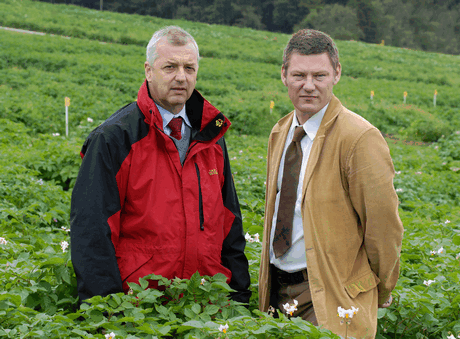Pesticide proposals cast extra cloud over key spud event
The prospect of a drastic cut in the industry’s pesticide asrmoury overshadowed last week’s Potatoes in Practice 2008 in Scotland. Andrew Blake reports.
Heavy rain turned the PiP site at Gourdie Farm, Invergowrie into a quagmire. But that was a mere inconvenience compared with the very real threat to production should the latest EU proposals on pesticides be adopted, according to Potato Council officials.
The next few months would be critical in the development of the new European Directive (News, 8 August, p20) as the proposals entered their second parliamentary reading in October, explained chief executive Helen Priestley.
Under them many familiar products for controlling blight, weeds and pests could be withdrawn.

The EU’s pesticide proposals pose a serious threat to potato production, according to Mike Storey (left) and Rob Clayton
To highlight its fears the council planned a special edition of its emailed Grower Gateway alerting levy-payers to the dangers and urging them to write to their MEPs – or, better still, to arrange autumn meetings to show them face-to-face how their businesses would be hit.
“We’re so concerned that we have already written to the EU Commissioner to raise awareness of how compromising the proposed changes might be,” said Ms Priestley.
Growers’ letters should ideally be posted to arrive mid-September onwards. “Earlier representations are likely to fall on deaf ears since the issue won’t be on the radar yet.”
The GG email offered guidance on preparing such letters, the key being to keep them short and polite – aggressive or rude ones could be ignored.
Under the proposed switch from risk-based to a hazard-based approvals, and depending on the severity of the eventual outcome of the EU proposals, many valuable pesticides (see tables) would no longer be available, warned the PC’s Rob Clayton.
“At present we’re between a crisis and a catastrophe.”
The withdrawal of mancozeb, with its key role in resistance management, would make blight control much harder just when the disease was becoming more aggressive, Dr Clayton explained.
Weed control
Residual weed control would become a considerable challenge, and without new products PCN control would be very difficult.
During the first parliamentary reading MEPs had proposed even tougher restrictions, he noted.
Should those parliamentary amendments be accepted, the impact on PCN and aphid/virus management would become much more immediate, and slug control and desiccation problematic. Over time blight control options would become limited and those for slug control would disappear.
There would be far fewer grass weed controls reducing potatoes’ value as a break crop, and long term storage for processing would be impossible without CIPC (chlorpropham).
“It’s really serious,” said colleague Mike Storey. “We need to get the message over to consumers that pesticides are widely used. If these proposals go through we won’t be able to produce the quantity and quality of a whole range of commodities we need in Europe.”
Residue limits
Contrary to some people’s understanding, limits on maximum residue limits would prevent imports from countries continuing to use pesticides denied to EU growers, Dr Storey believed.
“We won’t be able to pull in supplies from elsewhere.”
Dr Clayton said a key aim was to ensure everyone involved with potatoes, especially multinational companies, recognised the implications of the latest proposals and took steps to counter them.
Newly appointed PC chairman Allan Stevenson was alarmed that the true cost of the proposals had not been assessed before being put before MEPs.
“A European impact assessment must be carried out so that we don’t destroy a successful and vibrant industry,” he said. “We need time to respond and not have things imposed on us.”
Potato pesticides initially under threat in revised EU Directive
For withdrawal:
- Mancozeb (eg Dithane)
- Chlorothalonil/mancozeb (eg Adagio)
- Cymoxanil/mancozeb (eg Curzate M)
- Dimethomorph/mancozeb (eg Invader)
- Mancozeb/zoxamide (eg Electis)
- Iprodione (eg Rovral)
- Linuron (eg Alpha Linuron)
- Pendimethalin (eg Stomp)
For substitution (ie de-registered if suitable alternatives identified):
- Lambda-cyhalothrin (eg Hallmark Zeon)
- Pirimicarb (eg Aphox)
- Diquat (eg Reglone)
- Ethoprophos (eg Mocap)
- Fosthiazate (eg Nemathorin)
- Oxamyl (eg Vydate)
Potato pesticides under threat from parliamentary amendments
For withdrawal:
- All as in ‘for substitution’ in table 1 plus
- Cypermethrin & zeta-cypermethrin (various products)
- Methiocarb (eg Draza)
- Chlorothalonil (eg Bravo)
For substitution: (ie de-registered if suitable alternatives identified):
- Azoxystrobin (eg Amistar)
- Cymoxanil (eg Sipcam C50)
- Fluazinam (eg Shirlan)
- Fluazinam/metalaxyl (eg Epok)
- Metaldehyde (eg Metarex)
- Cycloxydim (eg Laser)
- Glyphosate (eg Roundup)
- Propaquizafop (eg Falcon)
- CIPC/chlorpropham (eg Gro-stop)
Do you fear losing key pesticides? Then support Farmers Weekly’s Save our Sprays campaign and signing our petition.

